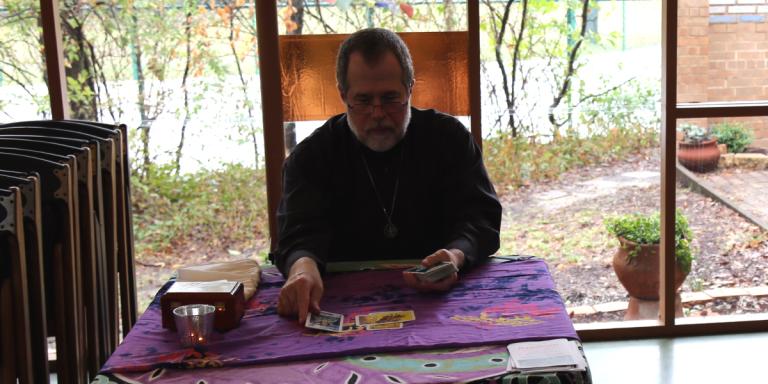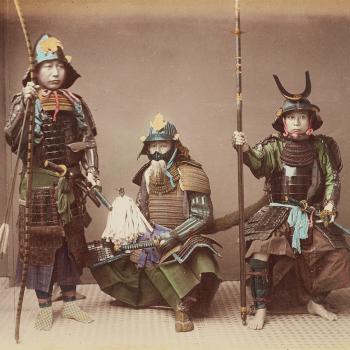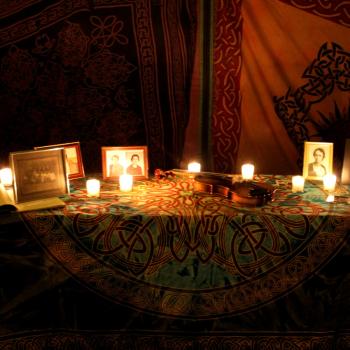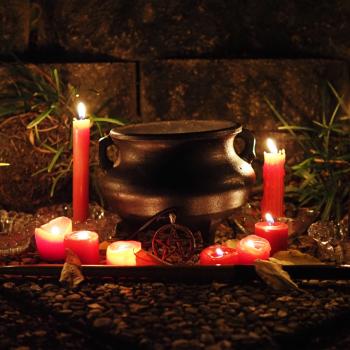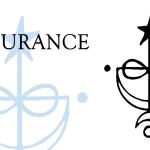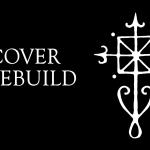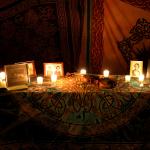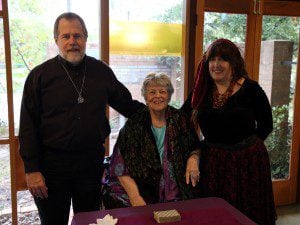
I grew up in a house where playing cards were frowned upon. Part of that was the stereotypical Baptist idea that anything fun must be sinful, but part was my parents’ experience with some family members who had been seriously harmed by gambling addictions.
If playing cards were bad, Tarot cards were worse. But I knew about them – they occasionally showed up in the old Universal horror movies or in Dark Shadows. And then there was Jane Seymour’s Domino in Live and Let Die, who read Tarot cards like they were monitors connected to spy satellites. My older brother had a deck at one point, and like all things forbidden I gravitated to them. When they didn’t give me any quick and easy messages from beyond I put them back and went on to something else.
When I started exploring Paganism, a Tarot deck was one of my first purchases – the Robin Wood Tarot. Although I have other decks, I use this one almost all the time. I like the way it uses the same structure as the more popular Rider-Waite deck but with Neopagan artwork and interpretations. It speaks to me in ways that other decks don’t.
I tried to learn Tarot from books (real books, not just the “little white book” that comes with the cards) and never could get it. I took an in-person class in Denton that helped, but as soon as the class was over I forgot everything I learned. I took the class a second time a couple years later and this time it stuck. I think I finally spent enough time with the books that I memorized the standard meanings and enough time with the cards that I started seeing the details of the artwork. The cards had always been speaking to me – now I could finally hear them.
I don’t read for the public very often. I’ve worked a couple parties and I occasionally read for friends, but I’ve usually got too much else to do. But when Denton UU decided to hold a Psychic Fair as a fundraiser, I agreed to help out by reading Tarot.
Last Saturday was a cool day with heavy rain – I didn’t expect much of a turnout. Instead, I had a steady stream of clients from noon to four, and a couple more before we closed down. Our two other readers (Dolores and Cynthia, also from Denton CUUPS) were as busy as I was. I had forgotten how draining continuous reading is!
As with most service work, I helped some people see some things, but I also learned (or in some cases, remembered) a few things myself.
I can’t see events. Want to know when you’re going to find a new lover? Want to know if you’re ever going to be a grandmother? I can’t help you. Go talk to Dolores – she can see that level of detail. I can’t. Maybe I don’t have enough experience to recognize the cards and combinations that would answer those kind of questions, or maybe I’m just reluctant to commit to a definitive answer I can’t substantiate, but regardless, if you want specific answers I can’t help you.
I can see patterns and trends. Fate is not fixed and the cards do not show what must be. Rather, they show what will be if we continue on our current path – sometimes in great clarity. I had several readings where I had to say “I can’t sugarcoat this for you – if you continue down this path you aren’t going to like the results.” I also had one where I said “you’re on the right path – keep it up and you’ll get where you want to be.” That’s the value of divination: not to satisfy your curiosity about the specifics of the future, but to help you understand when you need to just keep working and when you need to try a different approach.
It’s easier to read for Pagans. Most Pagans – even those who aren’t polytheists – have a common language around divination. Even those who are only casually familiar with the Tarot understand The Fool and The Magician, and the liminality present in several of the cards. They know not to take Death and The Devil literally, and they know The Tower means serious and unpleasant business. Perhaps most importantly, most Pagans have a shared understanding of what divination can and can’t do. I’m also far less reluctant to articulate (or try to articulate) UPG that comes to me during a reading to Pagans than to Christians or to the Spiritual But Not Religious.
The most important thing I can do is help people see clearly. Thorn Coyle (whose spiritual counseling has been extremely helpful to me) once told me her job is to hold a mirror up to her clients so they can see themselves as they really are. None of the strong emotional responses I got on Saturday came because I told someone something they didn’t know. The responses came because I told them something they already knew but had forgotten, or had tried to forget. They came because I reminded them of their own inherent value and worth. And they came because I reminded them that the path they’re on is taking them some place they don’t want to go – but they can choose another path.
Intuition is invaluable. I have skeptical friends who think divination is a waste of time and I have Christian friends who think it’s spiritually dangerous. Obviously I think they’re wrong or I wouldn’t read Tarot in the first place.
Humans are not rational creatures. Now, logic and rationality are very helpful tools, but there’s also a place for embracing our subjectivity and thinking symbolically. Sometimes what our so-called higher thinking can’t or won’t see, our older, more primitive intuition will.
I don’t plan on hanging out a shingle as a professional Tarot reading any time soon, but I enjoyed reading at the Psychic Fair on Saturday, and I learned a lot from the experience.
